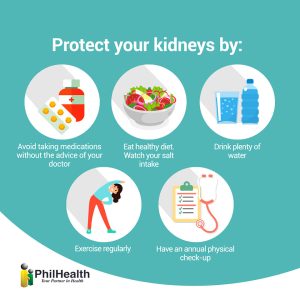While it is true that prevention is better than cure, a nephrologist from the Southern Philippines Medical Center (SPMC) in Davao City affirmed that the preventive practices against renal disease are no different from “rules and healthy habits imposed by our parents when we were little ones.”
“Kung ano naririnig natin sa ating mga magulang, yun din ang sinasai namin to our patients (What we hear from our parents is what we advise our patients),” Dr. Rachel Pableo Esquivel, a nephrologist from SPMC said during the Healthy Davao Media Forum at SM City Davao on Monday, June 24.
She added that to prevent developing renal disease, “we have to simply adhere to what our parents constantly reminded us when we were younger.”
“So motuo gyud ta sa atong parents (So we really have to believe in our parents),” she emphasized.
As simple as drinking water and eating vegetables and fruits, the same way our parents always reminded us to do, have a significant impact on our health, especially our kidneys, whose primary function is to filter the blood and remove waste and toxins from our body, Esquivel reiterated.
She emphasized that much of the kidneys’ health depends on what individuals consume, advising the public to always choose water over carbonated beverages or alcoholic drinks.
She said that although there’s no limit on how much water to drink, except for those with limitations due to their medical conditions, she advised to “drink what you can.”
When eating meat, she advised consuming only lean meat, not fatty ones, saying, “Fatty foods can contribute to cardiac disease, hypertension which also if accumulated can affect the kidneys.”
Esquivel also cited the importance of mobility or exercise to kidneys, even as simple as walking, just like what parents do allowing their children to go outside to play or move around.
For adults, she advised at least 150-minute weekly moderate exercise, such as walking. For intense exercise, she said 75 minutes per week is enough to keep the kidneys healthy.
She also warned the public about obesity, saying, “Obesity can also lead to another disease, aside from heart complications, it has an effect on our kidneys,” since once one is obese, the risk of having hypertension and diabetes is higher.
Another nephrologist from SPMC, Dr. Alrick Escudero, explained that kidney diseases such as chronic kidney disease are complications of diabetes and hypertension.
“More of the complications of an underlying disease kasi ang mahitabo mao ng magkaroon og problem sa kidney (Kidney problems occur as complications of underlying diseases),” he said.
He added, “But mainly ang pinaka-cause gyud [are] diabetes ug high blood na dili controlled or undetected (But mainly the primary causes are diabetes and high blood pressure that are not controlled or undetected).”
Notably, Escudero revealed that around 52.5 percent of their patients are diabetic, around 22.5 percent are hypertensive, and 12.5 percent have glomerulonephritis (inflammation of the tiny filters in the kidneys). Other conditions include familial diseases like polycystic kidney disease and NSAID-induced enteropathy.
This is why Esquivel emphasized the importance of having regular medical check-ups, especially among high-risk populations like those with underlying health conditions.
 Escudero added that kidney disease is preventable through regular screening and check-up and controlled blood pressure and diabetes.
Escudero added that kidney disease is preventable through regular screening and check-up and controlled blood pressure and diabetes.
Esquivel said, “Early detection is very important so that we can avoid complications. If there are already symptoms manifested, we can monitor and treat and try to reverse it or slow the progression of the kidney disease,” she said.
Another warning is against taking unprescribed medications such as pain relievers, saying that it is detrimental to our kidneys.
“What we usually buy in pharmacies is pain reliever, so we have to be really cautious when taking pain relievers because it has an effect on our kidneys as well,” Esquivel explained.
As part of the National Kidney Month celebration, Escudero said they will strengthen their advocacy campaign to increase awareness of kidney disease, saying it is “not only life-changing but also financially burdening.”
In the latest statistics, Escudero reported that renal disease, like chronic kidney disease, has been “a major health concern in the country,” with a prevalence rate of 35.94 percent, surpassing the global estimated rate of 9.1 to 13.4 percent.
Based on the Department of Health (DOH) data in 2022, he said that around 90,000 Filipinos are on dialysis. Of these patients, 2,400 patients are from the Davao region, and this number increases by 12 to 15 percent per year.
He added that only two percent of these patients had undergone kidney transplantation – the best treatment for kidney disease, while the remaining 94 percent are undergoing hemodialysis and four percent are on peritoneal dialysis. (ASO/PIA Davao Region)











